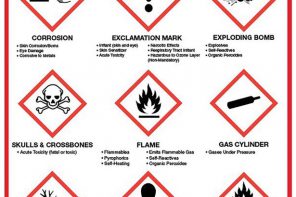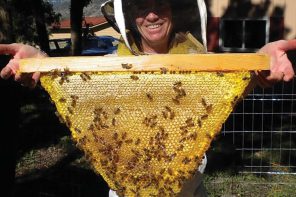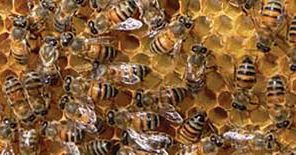By: Jerry Hayes
A 4.5 Million Dollar state of the art Honey Bee Lab, dozens of grad students over the years, a series of beekeeping videos, hundreds of talks here and overseas, many Federal and independent honey bee research projects and much, much more making Dr. Jamie Ellis at the University of Florida a respected and trusted Beekeeper Scientist.
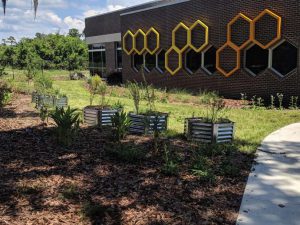
New University of Florida Lab. (UF photo)
Approximately 14 years ago when I was the Chief of Apiary Inspection for the Florida Dept of Agriculture and Consumer Services, the Florida State Beekeepers Association and individual beekeepers convinced the Univ. of Florida that filling a vacant position for a focused Honey Bee scientist was a Florida industry need. I was one of those selected to participate on the search committee. We had many outstanding candidates to choose from. After several weeks and lots of interviews and presentations by chosen candidates Dr. Jamie Ellis was selected. My office was within walking distance of the Entomology and Nematology building where the office of Jamie was located. I remember my first spontaneous visit to him in is new office. OMGosh . . . I was surprised and a bit taken back by his assigned 10’ x 10’ office space, a desk, phone, filing cabinet and a desk lamp as his start. But, none of this really concerned Jamie. His goal was to help beekeepers and he knew if he did that it would all be OK. I had the opportunity to get to know Jamie better over the years as he moved forward fulfilling his goal to help beekeepers and as we worked together and shared resources at times to move information and educational outreach to Beekeepers. I wouldn’t have taken the time to interview Dr. Jamie Ellis if I wasn’t impressed with all he is and has done. Take a few minutes to read about Jamie.
JH – Tell the story about how you became interested in wanting to have honey bees. I think you had a dream when you were six or seven years old if memory serves me correctly.
JE – Jerry – my earliest memory is that someone (a beekeeper I guess) came to visit our class when I was in Kindergarten or 1st grade. I remember getting a brochure on beekeeping that he passed out to the students. That brochure went into my toy box and resurfaced every once in a while. Shortly thereafter (maybe within a few years), I had a dream about keeping bees, a bit out of the blue. After that, I noticed (again, as a young kid) that a house on my bus route had a beehive in its backyard. At that time, my little brain put everything together and I wanted to start keeping bees.
JH – Then what happened? Did you keep the desire?
JE – From there, I pitched my interest to my parents, likely when I was around eight or so years old. They were supportive, but a bit reluctant since beekeeping wasn’t in my family. I read up on bees for the next four years and at 12 finally got my first hive. That is a story in-and-of-itself. In 6th grade, I mentioned to my science teacher that I was interested in keeping bees. Her uncle was a beekeeper (in North Carolina I believe). She asked me that if she brought me an empty hive, would I promise to fill it. I said I would. Well, she showed up at my house some weeks later with an empty beehive. I just needed bees. My dad happened to work with someone at the time who had been a beekeeper in the past. That individual had a friend who was still a beekeeper. I was put in touch with him. He became my mentor. He passed away about a year after we met, and I inherited his colonies (around 15 or so). I kept bees from that point forward, even today.
JH – As you entered those college bound years what did you want to major in? Wasn’t it entering the medical field?
JE – In middle and high school, I became very interested in 4-H and science fair. My projects were always bee centric. I was fortunate to be successful in various competitions with both groups and that really matured my interest in science. Also, during those years, I had met Dr. Keith Delaplane, bee scientist at UGA. My high school science teacher and I would bounce science fair projects off of him. He heard I was going to the University of Georgia, so he invited me to work in his lab as an undergraduate researcher. I took him up on that invitation and worked with him all four of my undergraduate years. Coming from a small town and going to a small school, I had come to believe that medicine was the pinnacle of science. I thought all good scientists became medical doctors. Thus, I went to UGA with a plan to major in biology with a declaration in pre-med, given I had plans to go to medical school after graduating. However, I learned while working with Dr. Delaplane that my real interests were with honey bees. Seeing that, Dr. Delaplane suggested I just marry my two interests: honey bees and science. I followed his advice and did just that.
JH – Did your family swallow their collective tongues that you were not going to pursue a Medical degree and instead become a Beekeeper Scientist?
JE – I was pretty close to taking the MCAT (the med school exam) and applying for medical school. It’s just that something didn’t seem right at the time. All of my friends and even my roommates where studying for their med exams, applying for med schools, etc. Somewhere in there, I decided that I wanted a PhD working with honey bees. I’ve not looked back, neither have I regretted it.
JH – In this part of the life journey when and how did you meet Amanda, your wife?
JE – As you know, I happen to be a Christian. I have been since I was seven and my faith is even stronger today (even if I constantly fail to live up to Jesus’ standard). While at UGA, I did some bi-vocational youth ministry work at the church where Amanda attended. Amanda was a freshman at UGA when I, a junior at UGA, started to work with the youth at her church. She helped out in various ways with the youth ministry and we just started dating. That was around late Summer 2000. We were married in March 2002 and have not looked back (we’ve not had time to look back given we now have four kids).
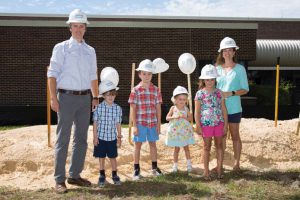
Jamie and family at the bee lab groundbreaking in October 2017. (Tyler Jones photo)
JH – Was she interested in honey bees or did she think you were an amazing unique person too?
JE – I think she was principally interested in science. Her undergrad degree from UGA is in wildlife biology. She likes the outdoors (and knows a good bit about trees, plants, wildlife, ecology, etc.). At the end of the day, I think it was all a “God thing” that we got together, have common interests, and happen to be very much in love (even today). She went on to get a MS in Zoology and a PhD in Entomology (honey bee pollination ecology). Even given that, I would not say her interest was in entomology specifically. She just happened to like all animals and already had two degrees that focused on mammals. So, she thought insects, well – honey bees, might be a nice intellectual pursuit. This, of course, was all after we met so I am sure her interests matured as she and I got to spend a lot of time together.
JH – What were your undergrad Degrees in?
JE – My degrees: BS biology from UGA, PhD Entomology from Rhodes University. Amanda’s degrees: BS wildlife biology from UGA, MS zoology from Rhodes University, PhD entomology UGA
JH – You skipped a Masters and went straight to a PhD at Rhodes Univ. in South Africa. There is a story here too. Nobody does this…do they?
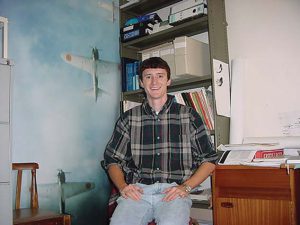
Jamie in his grad school office in the Zoology and Entomology Department at Rhodes University, 2001.
JE – It was not so common at the time. I was fortunate while an undergraduate that Dr. Delaplane allowed me to conduct three research projects which we later published in refereed journals. The point of a masters is to learn a field and to learn science. I felt I had already done both. By that time, I had kept bees for ten or so years, published popular and referred articles on bees, participated in a number of research projects, spoken to dozens of beekeeper groups, etc. So, I was fortunate to be able to forgo a masters and go straight into my PhD at Rhodes. Why Rhodes? Small hive beetles had just been found in the U.S. at the time. The USDA had an agreement with Rhodes University (in South Africa) to fund a student to study SHBs in South Africa. I was the fortunate student to be added to the project. I lived in South Africa for three years and enjoyed every second of my time there.
JH – You have always had a plan. What was it after getting your PhD? What did you want to do?
JE – I wanted to be a professor. That was my plan once I decided I wanted to go to graduate school.
JH – You did a Post Doc at UGA under Keith?
JE – After finishing my PhD, I returned to UGA and did a Post Doc with Dr. Delaplane. I was there for two years. It is also at that time that Amanda decided to do her PhD. So, she became one of Dr. Delaplane’s PhD students. We were fortunate to be able to work in the same lab.
JH – Was University of Florida on your short list or were there others?
JE – Most Post Docs, myself included, just want a permanent job anywhere they can find one. In 2006, I interviewed for and was offered the job I have now at UF. I had another offer from another institution at the same time. It was a hard decision at the time. Looking back, there honestly is no better place to work on honey bees than at UF. We have a wonderful university, a fantastic entomology department (currently ranked #1 in the world), and a great beekeeping community.
JH – What resources did you have when you started as an Assistant Professor at UF? What were your goals?
JE – My academic appointment is 70% extension, 20% research, and 10% instruction. Thus, when hired at UF, my start-up package (the amount of money I received when I arrived) was likely among the lowest offered to an assistant professor at that time. Given my high extension appointment, it was assumed I would not need much start-up. In fact, I had to ask for a lab because there seemed to be wavering interest in providing me one, given my low research appointment. I am not stating that as a shot at UF. I am just saying it because things have certainly changed since those days. At the time I was hired, I just wanted to find a way to help beekeepers in FL. Even before moving to FL, I was told by commercial beekeepers that the industry in FL is a hard place to survive. In fact, I even had one commercial beekeeper tell me that the FL beekeepers were going to “eat me alive.” I know, of course, he meant that tongue-in-cheek. However, it certainly illustrates the disconnect that many in the beekeeping industry have with research/extension labs (and vice versa). So, it looked like an uphill challenge. However, my team and I have been fortunate to develop wonderful relationships with beekeepers in the state. I believe, in fact, that our partnership with beekeepers and other collaborators (of course, the Florida Department of Agriculture and Consumer Services, Division of Plant Industries among them) have improved the industry in FL and laid an important foundation for future efforts addressing the sustainability of beekeeping in FL and elsewhere. I am fortunate to be here.
JH – So, you are the new young scientist with a 70% Extension appointment walking into the Univ. of Florida only 20% research. I’ll bet it was kind of scary in one of the biggest commercial beekeeping states. How did you connect with beekeepers?
JE – You may not remember it, but you as the Chief of Apiary Inspection at FDACS (Florida Dept. of Ag. and Consumer Services) had one of your key Inspectors, David Westervelt, take me around and introduce me to some of the most influential commercial beekeepers in Florida, which was a great start. Then, being able to go to and present at the Florida State Beekeepers Assoc. meetings and lots of local meetings, I was able to get my face and my message out there. We developed the ‘UF Bee College’ and that attracted hundreds of mostly smaller-scale beekeepers. We also produced a whole series of videos that were really popular. Furthermore, I worked with the Florida Farm Bureau on honey bee issues and served on various beekeeping-related committees. I also worked on research projects with you at FDACS. Despite this, networking with and gaining the trust of commercial beekeepers has taken some time.
JH – I keep thinking that you had a 70% Extension appt. How the heck did you get approval to start research and get a Lab?
JE – My Dept. Chair, Dr. John Capinera, knew that part of extension was conducting research for beekeepers and translating that research into actionable management practices. Dr. Glenn Hall managed the UF Bee Biology unit and allowed me to share space with him. I also had some lab space on campus, though it was quite a small lab. Finally, I was given graduate student funding as part of my start-up package. Thus, I had some lab space, an active student and grew the program from there.
JH – Tells us about how you grew your tiny Lab doing solid research for beekeepers into the amazing Lab you have now.
JE – It was all about years of hard work with outstanding support by the Florida State Beekeepers Assoc., Commercial Beekeepers, terrific students, lots of grant proposals, contracts to do honey bee work, federal grants and the continued support of my Dept. Chairs and colleagues. No one does this kind of thing alone. It took all of us working for the same goal (you know, kind of like a honey bee colony).
JH – Now you have a four million dollar plus Lab! How did that happen?
JE – I cannot remember exactly now, but about six or eight years ago, Laurence Cutts and Gordon Clauss (both FL beekeepers) came to visit me on campus one day. They had just started the Cutts Foundation, an organization with a goal of supporting honey bee research. They requested that I put together a list of research equipment I might need for my lab. I told them that their support was appreciated, but tongue-in-cheek replied that I did not really have room for more equipment – what I needed was a new lab. At the time, I did not really appreciate how this seed would take root and grow to what it ultimately became, a new honey bee laboratory at UF.
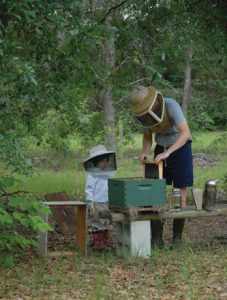
Working colonies with Mathias when he was four years old. Jamie involves his kids in his professional life. They work bees with him and travel with him to various bee meetings all around the world.
Laurence and Gordon took the idea to the Florida State Beekeepers Association, where the idea seemed to gain quick support. The FSBA leadership put together a lobbying effort to try to secure funding from the Florida State Legislature. To do this, they needed an approximate square footage and cost for the building. So, I worked with UF/IFAS facilities personnel to develop a rough sketch of a 10,000 square foot, $3.5 million building. The FSBA, wisely, partnered with hobby and commercial beekeepers, the University of Florida, and various other groups to develop a lobby plan for the building.
With the plan and partners in place, the FSBA took that information to the FL Legislature and secured $2.5 million in support the first year they attempted. However, the governor at the time vetoed the facility. That was a crushing blow to our optimism. The idea of a new lab had support everywhere it seemed, everywhere except the governor’s office. Not deterred, the FSBA tried again a second year and managed to secure $2.5 million in support, only to have the governor veto it a second time. Honestly, that was the most difficult blow. We had tried twice, but to no avail. It really looked like the idea was dead for good.
To our surprise, FL State Senator Alan Hayes suggested the FSBA try a third year. That year, the state allocated $2 million to the project with the caveat that the beekeepers contribute $200,000 and the University of Florida contribute $500,000. All parties agreed and this is the proposal the ultimately made it by the governor’s desk.
Despite our success, we had $2.7 million of a $3.5 million+ building. So, the FSBA and its partners went back to work. They created a fundraising committee composed of beekeepers and other partners who, with unrestrained support of the FL beekeepers and additional financial support from UF, raised an additional $2 million! All-in-all, we now had $4.5 million in hand!
In October 2017, ground was broken for the new lab. We moved into the first of three buildings in June 2018, just nine months later. Three months after that (September 2018), we moved into the final two buildings. At the end of the day, the $4.5 million built three buildings that total over 16,000 square feet of space, a 60% improvement over what we intended to build in the first place. The first building (>8000 square feet) contains a huge research laboratory, associated research support space, office space for the UF bee team, a teaching classroom, a conference room, graduate student and visiting scholar office, and a large observation hive room that can accommodate 12 observations hives (light and climate-controlled), and other support space. We also have a teaching pavilion (~1,400 square feet) that seats 150 people and a third building (>6,000 square feet) that includes a workshop, a honey extraction and processing facility, offices for the state’s bee inspection program, and a beekeeping museum.
Most of these spaces were made possible by individual or beekeeping industry donors who sponsored rooms for naming rights. I cannot stress to you enough how amazing it was to see individual beekeepers, local bee clubs, state bee clubs, etc. get behind the building and actually support its development financially, and with their time, etc. I am forever indebted to the beekeepers who believed in us enough to support this effort. So many people worked to make this a reality. I would need a separate column just to acknowledge everyone. Consequently, I just want to give a blanket “thanks” to everyone who was involved.
JH – Amazing! What public and Florida Beekeepers, UF, students, support and encouragement from your family has resulted in. And it’s not over yet. Last question, what would you like to leave with Bee Culture readers?
JE – Fundamentally I want Bee Culture readers to know that scientists need beekeepers to help them be more successful. Scientists need to know what beekeepers need and the only way that can happen is to have an open and free dialogue based on trust. By the same token, beekeepers cannot just tell a scientist what they need and expect the scientist to have the resources to get it done. They have to be active and collaborate with the scientist to move the project ideas forward. How? Lend colonies to the scientist. Help with field research and trials. Finally, remember that research is not free. Labs still have to pay the electric and water costs, student scholarships, truck repairs, materials, supplies, etc. The list goes on and on. It is truly a collaborative process. Without beekeepers none of what we do at UF would be possible. I am truly blessed.







